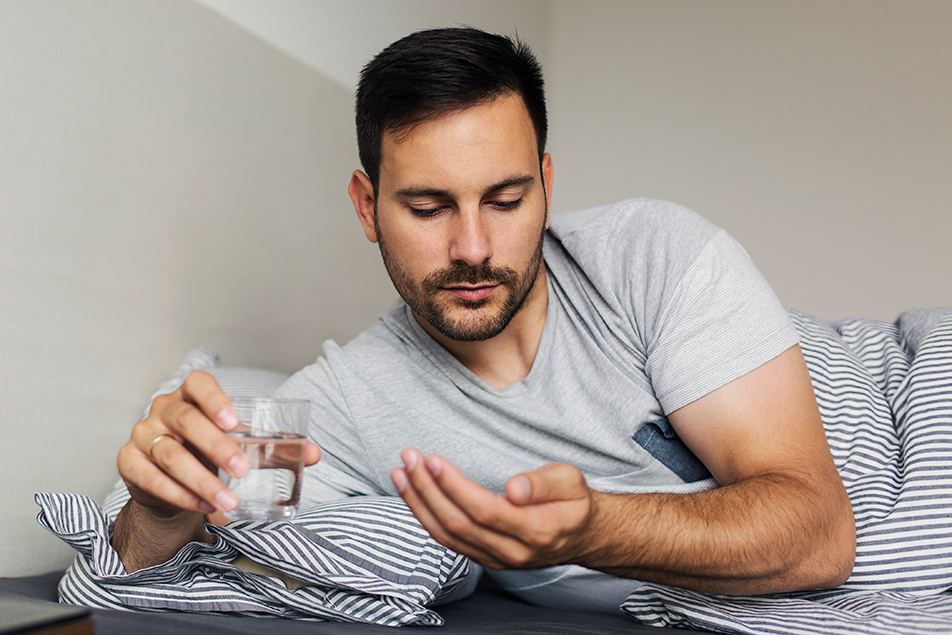
We’ve all been there. You glance at the clock sitting on your nightstand and the numbers keep ticking by. It’s another sleepless night and you’re wondering what you can do to find relief. We asked Aaron Roberts, MD, PPG – Sleep Medicine, to walk us through the risks and benefits of sleep aids, plus possible treatment options for a restful night.
When should a person use sleep aids?
The short answer? Only under the direct supervision of a physician. Also, it’s best to weigh the risks and benefits before starting any medication. The National Sleep Foundation (NSF) and American Academy of Sleep Medicine (AASM) came out with guidelines in 2017, which do not recommend the use of medication as the first line of treatment for insomnia. Instead, they recommend Cognitive Behavioral Therapy (CBT), which is a form of psychology done by someone specifically trained in sleep medicine, as the initial treatment for insomnia. However, if you’ve tried and been unsuccessful with CBT, and insomnia is still causing impairment, then and only then would medication be considered for treatment.
What are the risks associated with sleep aids?
It depends on which ones you are taking, but many have a number of risks associated with them. Many can cause sleepwalking, falls, dizziness, dependencies, heart arrhythmias, grogginess, hangover-like symptoms and more. These substances have also been known to cause dependency issues like rebound insomnia, where they’ve stopped taking the medication, but their insomnia worsens, and the drug is no longer effective. Their body may become psychologically dependent on it. These medications can also cause cognitive issues or memory problems. There are increased risks and a higher tendency for developing Alzheimer’s disease or dementia with prolonged use, especially in the elderly. In most cases, the risks outweigh the benefits.
Are “natural” remedies, such as chamomile tea or melatonin helpful?
They can be. Tea and melatonin can help people relax and calm down, but they’re not as potent or as strong as prescription medications. The side effects and health risks are much lower, but so is the effectiveness for most individuals. If it works, you can certainly keep using it, but if you’re utilizing it as a mainstay for treating insomnia, you might need to seek other means.
Are “natural” remedies, such as magnesium, better?
We often recommend magnesium only for people who have trouble sleeping due to leg cramps, but not solely for addressing insomnia.
Are there risks associated with melatonin?
Very minimal, but with anything you ingest there is a potential risk. Melatonin is not regulated by the Food & Drug Administration (FDA). You’re really taking it at your own risk. Additionally, there can potentially be some negative side effects such as nightmares and alterations to blood sugars.
Are over-the-counter sleep aids safe?
As mentioned before, the AASM clinical update in 2017 does not recommend the use of over-the-counter sleep aids. The potential risks and side effects vastly outweigh the benefits of using them. Instead, please speak with your primary care provider about your symptoms. They can help you find the best treatment plan for you.
When should someone pursue prescription sleep aids?
Everyone will likely have some form of insomnia in their lifetime, but most people will be able to get over their bout. There are a few people, however, that will have chronic insomnia. Those most at risk are the elderly, women and people with comorbidities like anxiety, depression or chronic pain.
If you’ve put in the effort to improve your sleep habits by practicing proper sleep hygiene, limiting technology two hours before bed and adjusting your diet, but you’re still experiencing daytime symptoms such as trouble concentrating, mood disorder and fatigue, it’s recommended that you speak with your primary care provider on next steps and treatment options.
Final thoughts
When we do prescribe sleep aids, the goal is to get the lowest, most effective dose possible, and it should all be used in conjunction with some form of CBT and under the direct supervision of a medical professional.



